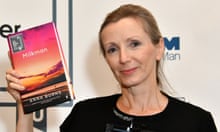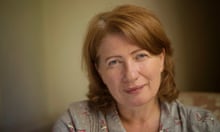The 27-year-old British novelist Daisy Johnson has become the youngest writer ever to be shortlisted for the Man Booker prize, with her novel Everything Under, about a troubled mother-daughter relationship that reimagines Greek myth in modern Britain. It is one of six novels on a shortlist described by the chair of judges as reflecting the “dark times” we live in.
Johnson’s debut was chosen ahead of bestselling longlisted novels from former winner Michael Ondaatje and the widely acclaimed young Irish novelist Sally Rooney. Following a lexicographer’s search for the mother she hasn’t seen since she was 16, judge and crime writer Val McDermid called Everything Under a “modern variation on Sophocles’ Oedipus”, in which “the natural world is evoked with sinister sensitivity”.
Born in 1990, and already winner of a clutch of prizes for her short-story collection Fen, Johnson is not the first 27-year old to make the final Booker line-up, although she is the youngest. In 2013, New Zealander Eleanor Catton became the youngest ever shortlisted writer at 27, going on to win the prize at aged 28 for her novel The Luminaries. Now living in Oxford, where she did a master’s in creative writing, Johnson has said that she wanted “to write about women who are mothers and daughters and who find it difficult to sit within those roles”.
Unveiling this year’s Booker shortlist, which runs the gamut of topics from sexual abuse to environmental crisis, chair Kwame Anthony Appiah said that the dominant theme among the 171 books submitted for the prize was, “our species, and sometimes the other species who share this small planet, challenged by anxiety, suffering, pain; our institutions and our environment under threat.”
“We live in dark times,” Appiah said. “Or, at least our novelists think we live in dark times.”
Alongside Johnson, the shortlist also features Northern Irish author Anna Burns’s experimental novel Milkman, which takes on the Troubles in Northern Ireland through a young woman’s perspective, and Canadian Esi Edugyan’s Washington Black, an exploration of race based on a true story, in which an 11-year-old slave becomes the personal servant to the English owner of a Barbados sugar plantation.
American novelists Rachel Kushner and Richard Powers were also nominated: Kushner for The Mars Room, which takes on gender and class in a story of poverty and incarceration; and the National Book Award-winning Powers for The Overstory, about nine strangers trying to save a continent’s last few acres of virgin forest.
The shortlist is completed with Scottish poet Robin Robertson’s first novel The Long Take, told in verse about a D-Day veteran with post-traumatic stress disorder.
Judge and critic Leo Robson described the books as “catalogues of major human crises”, while McDermid said: “These books are about dark times – and we are in dark times, there is no doubt about that. But reading them has not left me in a state of depression.”
Judge and feminist writer Jacqueline Rose said it would have been impossible to pick a shortlist that didn’t delve into the darker places of the world. “It was across the board [in submissions] – unavoidable,” said Rose. “But hope is in the writing of the books – the fact people can go into this darkness and write about it. We’re paying tribute to the books here, which have the courage to go into incredibly painful places.”
Appiah agreed: “Each one in its own way explores the anatomy of pain – being incarcerated, or on a slave plantation, or in a society fractured by sectarian violence ... Even in the natural world. Yet the ingenuity with which our writers evoke and respond to these challenges shows the continuing strength of the novel as a site of reflection on what matters most in our human experience.”
The panel of judges passed over the longlist’s two most surprising contenders, Belinda Bauer’s thriller Snap and Nick Drnaso’s Sabrina, but Appiah said that all six books chosen by the panel were “miracles of stylistic invention”.
Waterstones fiction buyer Bea Carvalho said the lineup of six books offered a snapshot of some of the very best of this year’s new fiction publishing. “The inclusion of poetry in the form of The Long Take offers something unique, [though] we’re a bit surprised to see Sally Rooney out of the race. Washington Black has been a real highlight for me this year. Personally I’ll be rooting for Esi Edugyan but they’d all be very worthy winners.”
With the shortlist comprising three writers from the UK, one from Canada and two from the US, the possibility of a third consecutive American winner remains open. The controversial 2013 decision to allow American writers to compete for the award was most recently criticised by previous winners Julian Barnes and Peter Carey, who called it “an exercise in global corporate branding” and “daft” at a Man Booker event in July. In February, a group of 30 publishers wrote to the prize organisers asking them to reconsider or risk a “homogenised literary future”.
Appiah said that it wasn’t up to him to decide whether or not to allow Americans to compete, but “if I were to advise the Booker prize foundation, I would say that the kind of people who read literary fiction do not ask authors for their passports.”
The winner will be announced on 16 October at a dinner in London’s Guildhall.









Comments (…)
Sign in or create your Guardian account to join the discussion